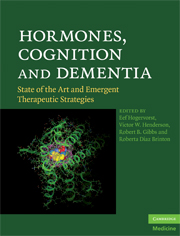Book contents
- Hormones, Cognition and Dementia
- Hormones, Cognition and Dementia
- Copyright page
- Contents
- Contributors
- Preface
- Section 1 Estrogens and cognition: perspectives and opportunities in the wake of the Women's Health Initiative Memory Study
- Chapter 1 Women's Health Initiative Memory Study (WHIMS) program: emerging findings
- Chapter 2 Identifying risk factors for cognitive change in the Women's Health Initiative: a neural networks approach
- Chapter 3 Estrogen therapy – relationship to longevity and prevalent dementia in the oldest-old: the Leisure World Cohort Study and the 90+ Study
- Chapter 4 The critical window hypothesis: hormone exposures and cognitive outcomes after menopause
- Chapter 5 Animal studies that support estrogen effects on cognitive performance and the cholinergic basis of the critical period hypothesis
- Chapter 6 The healthy cell bias of estrogen action through regulating glucose metabolism and mitochondrial function: implications for prevention of Alzheimer's disease
- Section 2 Varieties of estrogenic therapy
- Section 3 Potential modulators and modifiers of estrogenic effects
- Section 4 Possible genetic factors related to hormone treatment effects
- Section 5 Testosterone, estradiol and men, and sex hormone binding globulin
- Section 6 Gonadotropin effects
- Index
- Plate Section
Chapter 6 - The healthy cell bias of estrogen action through regulating glucose metabolism and mitochondrial function: implications for prevention of Alzheimer's disease
from Section 1 - Estrogens and cognition: perspectives and opportunities in the wake of the Women's Health Initiative Memory Study
Published online by Cambridge University Press: 06 July 2010
- Hormones, Cognition and Dementia
- Hormones, Cognition and Dementia
- Copyright page
- Contents
- Contributors
- Preface
- Section 1 Estrogens and cognition: perspectives and opportunities in the wake of the Women's Health Initiative Memory Study
- Chapter 1 Women's Health Initiative Memory Study (WHIMS) program: emerging findings
- Chapter 2 Identifying risk factors for cognitive change in the Women's Health Initiative: a neural networks approach
- Chapter 3 Estrogen therapy – relationship to longevity and prevalent dementia in the oldest-old: the Leisure World Cohort Study and the 90+ Study
- Chapter 4 The critical window hypothesis: hormone exposures and cognitive outcomes after menopause
- Chapter 5 Animal studies that support estrogen effects on cognitive performance and the cholinergic basis of the critical period hypothesis
- Chapter 6 The healthy cell bias of estrogen action through regulating glucose metabolism and mitochondrial function: implications for prevention of Alzheimer's disease
- Section 2 Varieties of estrogenic therapy
- Section 3 Potential modulators and modifiers of estrogenic effects
- Section 4 Possible genetic factors related to hormone treatment effects
- Section 5 Testosterone, estradiol and men, and sex hormone binding globulin
- Section 6 Gonadotropin effects
- Index
- Plate Section
Summary
Brinton provides a comprehensive review of the effects of estradiol on glycolytic enzymes and glucose metabolism in the brain and in neurons. Her analysis reveals a large body of corroborating evidence converging on the conclusion that estradiol promotes enhanced utilization of glucose in the brain, thereby helping neurons to meet the energy demands of neuronal activation. Seeing as how dysfunction of glucose metabolism and neuronal biogenetics are antecedents to Alzheimer's disease (AD), it is reasonable to speculate how the effects of estrogens on glucose metabolism might help stave off the disease. Her studies show, however, that as neurons become compromised such as in the context of aging and/or disease, the effects of estrogens can become deleterious and ultimately lead to the activation of apoptotic pathways and neuronal death. Hence the hypothesis that as neurons age and become increasingly stressed or compromised, the net effect of estrogens on oxidative metabolism and neuronal survival shifts from positive to negative. This healthy cell bias may explain some of the recent negative clinical results, and in particular how estrogenic therapy administered around the time of the perimenopause can be beneficial whereas the same therapy administered late in life and in the context of a developing pathology could be detrimental and result in significant cognitive decline.
- Type
- Chapter
- Information
- Hormones, Cognition and DementiaState of the Art and Emergent Therapeutic Strategies, pp. 55 - 64Publisher: Cambridge University PressPrint publication year: 2009



